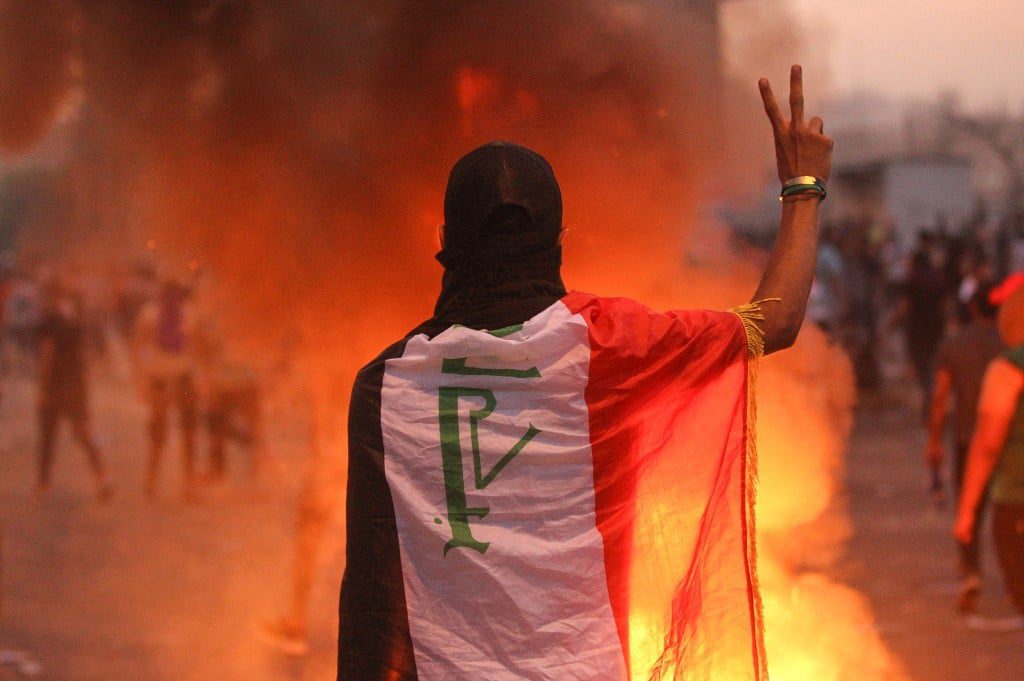
Since 1 October 2019, Iraq has been rocked by a new wave of anti-government protests that started in the capital Baghdad and spread to the southern cities amid a violent government crackdown.
Almost 100 people had been killed, as of 5 October. In addition, over 1,000 people have been injured, according to the Iraq Human Rights Commission (IHRC), with police using rubber bullets, water cannons and live rounds to try and disperse the crowds.
A curfew has been imposed on several cities and the internet has been blocked to restrict social media use and other online means for protestors to communicate with each other or distribute images of the protests.
Rights groups expressed concern that the protests, which reportedly started peacefully, have been met with disproportionate force in Baghdad, Nasiriyah, Amara and Basra. The Kurdish north is one of the few areas untouched by the unrest.
Two border crossings with Iran were closed and protestors temporarily barricaded Baghdad’s airport. They also threatened to storm the American embassy, forcing it to suspend consular services.
The country is no stranger to demonstrations, but this time the mass action appears to be more widespread and less coordinated, making it harder to contain. The cause of the unrest is, however, a long and familiar list of grievances.
Protests are often instigated by Shia cleric and political leader Muqtada al-Sadr. In May, for instance, thousands joined rallies to urge Iraq’s leaders to stay out of the political conflicts between Iran and the United States (US).
There has been growing discontent at poor state services and worsening health care. Contaminated water supplies in Basra, for instance, were found to have poisoned 60,000 people over the course of one month in 2018, driving people on to the streets to demand reforms at the governorate and national level.
Currently, Iraq has only around 12 hours of electricity a day. Endemic corruption has also drawn scorn from the population, with successive administrations accused of syphoning off up to $450 billion in state funds. Iraq was ranked 168th out of 180 countries in Transparency International’s Corruption Perceptions Index 2018.

According to Abbas Kadhim, senior fellow and Iraq Initiative director at the Atlantic Council, the recent protests were triggered in part by the removal of popular counter-terrorism chief General Abdul Gani Asadi, who is largely credited with driving the Islamic State out of Iraq.
“It was unexpected because the Iraq government was [enjoying] a summer without any major protests, an indicator that services had seen some improvement that had previously been the main cause of discontent in the country,” he said.
The initial protests escalated after they were met with violence and arrests turned into injuries.
Protesters have also been calling for a homeland or watan and shouting slogans against Iran for interfering in Iraq’s affairs, such as recent warnings by Iran that it would target the US in Iraq if the US threatened Iran.
There were also reports that members of an Iraqi diplomatic delegation were threatened in the Iranian city of Mashhad, which led Iraq’s Foreign Ministry to close its consulate in the city.
According to Clarisse Pásztory, a senior European diplomat who served in both Baghdad and Erbil, in addition to grievances over services, “There is a sense, particularly in the Shia south, that Iraq is serving regional interests and ‘masters’ [rather] than its own diffuse interests. The main external target of complaint seems to be Iran, hence nothing sectarian.”
She added that, instead of tough policing, “there needs to be some credible vision toward a better future”.
Other reports claimed that Mohammad Reza Sistani, the son of religious leader Ayatollah Ali al-Sistani, warned Qassem Soleimani, commander of Iran’s Quds Force, that Iraqis would rise up should Iran deal with Iraq in this way.
Some members of the political elite expressed sympathy with the protesters’ demands, such as parliamentary speaker Mohamed al-Halbousi. Ala al-Alwan, health minister and former regional director of the World Health Organization, tried to resign in September, citing blackmail and corruption in his letter of resignation, which the government rejected.
Al-Sadr, whose coalition won the largest number of seats in last year’s elections, called for the entire government to resign, demanding snap elections monitored by international experts and urging legislators to boycott parliamentary sessions until the government responds to the protesters’ demands.
Despite blame being directed at the government, Prime Minister Adel Abdul Mahdi only took office at the beginning of the year and inherited most of the problems plaguing the country.
Years of instability and sanctions have led to severe economic hardship even though Iraq has the world’s fourth-largest oil reserves, according to the International Monetary Fund. However, World Bank figures show almost three fifths of the 40 million Iraqis live on less than $6 a day. Unemployment is also high, and schools, power supplies and infrastructure are poor.
In a televised address in the early hours of Friday morning, October 4th, 2019, Mahdi admitted there was no silver bullet for endemic problems such as corruption.
He did, however, pledge to pass legislation to provide the poorest families with a basic income and to create better employment opportunities.
As the death toll continues to rise, the United Nations has asked for dialogue while Amnesty International (AI) said security forces must immediately stop using excessive and lethal force against protesters.
“It is outrageous that Iraqi security forces time and again deal with protesters with such brutality using lethal and unnecessary force,” said Lynn Maalouf, AI’s Middle East research director.
She added, “The state must commit to holding those responsible to account. This must not be yet another case of the government announcing an investigation or committee of inquiry which never yields any results.”


